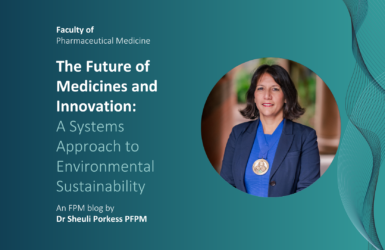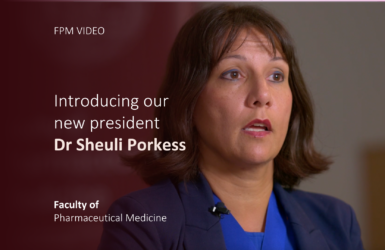Understanding and responding to the impacts of COVID-19 on women’s health
Posted on: Thursday 21 October 2021
Author: Dr Sheuli Porkess
This blog article has been prepared by Dr Sheuli Porkess.
It is provided for information and does not constitute advice or represent official FPM views or policy.
How to cite:
Porkess, S (2021), ‘Understanding and responding to the impacts of COVID-19 on women’s health’, Faculty of Pharmaceutical Medicine, 21 October 2021. Available at: https://www.fpm.org.uk/blog/understanding-and-responding-to-the-impacts-of-covid-19-on-womens-health/ (Accessed: <date>).
COVID-19 has affected everything. The impact of COVID-19 on women and women’s health has been described as a ‘pandemic within a pandemic’1,2, which is exposing and amplifying pre-existing inequalities between women and men, with issues including a surge in domestic violence. It is well known that women’s employment has been disproportionately affected by the pandemic, with key workers, healthcare workers and social care workers more likely to be women. Economic hardship for women who are self-employed has been common with a lack of furlough, as well as lack of employer support. Women are also overrepresented in economic sectors most hit, such as domestic jobs and hospitality. The gender gap in the provision of childcare has also increased over the pandemic, putting an additional burden on working mothers.
From a health perspective, it is estimated that there may be 1.4 million unintended pregnancies worldwide due to the pandemic3. The number of pregnant and postpartum women hospitalised or requiring intensive care due to covid-19 has reached record highs in England, Wales and Northern Ireland4. Maternal mortality due to Covid-19 has also been recorded in the United States with increasing levels seen in Brazil and India during the second wave5,6,7.
Issues such as the inclusion of pregnant and lactating women in clinical trials, the drought in pharmaceutical investment in women’s health products, different physiology of women at different phases in their lives and also better control of information to women in the media have been raised before from a pharmaceutical medicine perspective. The recent ‘Venice Forum’, a multidisciplinary global conference aimed at raising global issues of relating to women and child health, focused on “Why investing in Maternal, Newborn and Child Health (MNCH) is critical for sustainable recovery after COVID-19”8.
Even within the research of COVID-19 vaccines and therapeutics, there has been underrepresentation of women, including pregnant women, which has delayed roll out to these groups. During vaccine and therapeutic trials, the lack of provision for women’s health issues was evident. One example is the emerging reports of short-term menstrual changes potentially seen after receiving COVID-19 vaccination. It is important to understand and characterise this in order to avoid vaccine hesitancy, and research into this is now being funded by NIH9.
It is evident from recent research that women’s participation in healthcare and clinical trials has also been disproportionately affected by COVID-1910. Even more severely impacted are women in under-recognised or under-represented groups. Ethnic minorities in the UK11 and around the world12,13 have been severely affected, none more so than refugees, migrants and internally displaced persons. There are significant gaps in cultural understanding, and access to healthcare and research, especially in maternal health14,15. These groups are vulnerable, largely invisible to global and internal structures, the populations are fragmentary and much more work needs to be done in this area.
There is evidence to suggest that women’s physical and mental health all over the world has been affected more than in men. Maternal health has been severely affected and anxiety and mental health issues amongst pregnant women and new mothers has risen significantly16,17.
The shift to working from home and online working has also affected women disproportionately with more women having to take on more of the childcare and other domestic responsibilities. There is mounting evidence in the reduced rates of academic output and publication rates of women18 during the COVID-19 pandemic, which is thought to be related to the increased domestic and caring responsibilities19,20,21. This will not only affect those individual researchers in their career but also means that their perspectives and research are missing from the scientific literature and debate.
What have we learnt? What should happen next?
It is vital that investment in women’s and maternal health is considered critical for sustainable recovery after COVID-19. We would encourage regulators, academia, investors and companies to learn from the adaptations, innovations and mistakes that brought into focus key improvements to medical interventions (such as the importance of bringing pregnant women into clinical trials) during the development of COVID-19 therapies and vaccines. One of the most critical aspects has been collaboration between the many different disciplines of people involved in women’s healthcare, and raising awareness both regionally and globally of how barriers can be broken down.
There should be emphasis on COVID-19 initiatives that promote prioritisation of sex and gender responsive actions, in order to direct research to match the issues experienced such as women’s mental health. Clinical research should aim to understand the health and wellbeing needs of women across their life course. There needs to be more research into the long-term impacts of COVID on women’s health and monitoring of the direct effects of long-COVID. As data on long COVID emerge, there are differences in the profiles of who is suffering with which cluster of symptoms and any differentiation on the effect for women needs to be researched further22. Funding and governance bodies should prioritise proportional inclusion of women in research, both as researcher leaders and as participants and understand the barriers that might inhibit this so that they can be overcome.
At FPM, we are committed to women’s health through collaboration with partners such as Medical Women’s Federation, through engagement with policy development, through supporting women in the workplace and working with our members to define how pharmaceutical medicine can address the issues.
References
1. https://ec.europa.eu/commission/presscorner/detail/en/IP_21_1011
2. https://www.un.org/sustainabledevelopment/gender-equality/
3. https://www.unfpa.org/sites/default/files/resource-pdf/COVID_Impact_FP_V5.pdf
4. ICNARC. ICNARC report on COVID-19 in critical care. England, Wales and Northern Ireland, 24 September 2021. Available from: https://www.icnarc.org/Our-Audit/Audits/Cmp/Reports
5. CDC COVID Data Tracker [Internet]. [cited 2021 Sep 20]. Available from: https://covid.cdc.gov/covid-data-tracker/#pregnant-population
6. Takemoto MLS, Nakamura-Pereira M, Menezes MO, Katz L, Knobel R, Amorim MMR, et al. Higher case fatality rate among obstetric patients with COVID-19 in the second year of pandemic in Brazil: do new genetic variants play a role? medRxiv [Internet]. 2021;2021.05.06.21256651. Available from: https://doi.org/10.1101/2021.05.06.21256651%0Ahttp://medrxiv.org/content/early/2021/05/08/2021.05.06.21256651.abstract
7. Mahajan NN, Pophalkar M, Patil S, Yewale B, Chaaithanya IK, Mahale SD, et al. Pregnancy Outcomes and Maternal Complications During the Second Wave of Coronavirus Disease 2019 (COVID-19) in India. Obstet Gynecol [Internet]. 9900; Available from: https://journals.lww.com/greenjournal/Fulltext/9900/Pregnancy_Outcomes_and_Maternal_Complications.230.aspx
8. https://www.thelancet.com/pdfs/journals/langlo/PIIS2214-109X(21)00178-9.pdf
9. https://www.nichd.nih.gov/newsroom/news/083021-COVID-19-vaccination-menstruation
10. Dadelszen et al. BMJ 2020;369:m2287
11. https://www.thelancet.com/journals/lancet/article/PIIS0140-6736(21)00949-1/fulltext accessed
12. US Centers for Disease Control and Prevention. COVID-19 hospitalization and death by race/ethnicity. 2020. https://www.cdc.gov/coronavirus/2019-ncov/covid-data/investigations-discovery/hospitalization-death-by-race-ethnicity.html
14. https://acmedsci.ac.uk/file-download/86001873
15. https://acmedsci.ac.uk/file-download/26403424
16. Wu Y, et al. Perinatal depressive and anxiety symptoms of pregnant women during the coronavirus disease 2019 outbreak in China. Am J Obstet Gynecol. 2020;223(2):240.e1-240.e9. doi:10.1016/j.ajog.2020.05.009
17. Davenport MH, Meyer S, Meah VL, Strynadka MC, Khurana R. Moms are not OK: COVID-19 and maternal mental health. Front Glob Womens Health. Published online June 19, 2020. doi:10.3389/fgwh.2020.00001
18. Women sidelined in pandemic research BMJ 2021;375:n2381 http://dx.doi.org/10.1136/bmj.n2381
19. https://bmjopen.bmj.com/content/11/4/e045176
20. https://gh.bmj.com/content/5/7/e002922
21. https://www.nature.com/articles/d41586-020-01294-9
22. https://www.phosp.org/news-media/seven-in-ten-not-fully-recovered/
More from Dr Sheuli Porkess

The Future of Medicines and Innovation: A Systems Approach to Environmental Sustainability
Find out more

Embracing the Future: Advancing Pharmaceutical Medicine for Global Health
A blog by our President, Dr Sheuli Porkess PFPM

FPM supports the ABPI’s position on Legitimate Interests
The ABPI has today released new guidance to pharmaceutical companies using Disclosure UK to boost transparency.

Fireside Chat with Dr Bu Siakpere
Dr Sheuli Porkess and Dr Bu Siakpere will reflect on whether we can do more to improve equality, diversity and inclusivity.

Understanding and responding to the impacts of COVID-19 on women’s health
Dr Sheuli Porkess examines the disproportionate impact of the pandemic on women and women’s health

PMST is your route to professionalism in Pharmaceutical Medicine
Dr Sheuli Porkess examines the significance of the new PMST curriculum

FPM announces next Vice-President and Registrar
Sheuli Porkess and Chris Worth will take up their positions in November 2021.






